
In the Divided States of America, where a volatile reality-show president is in the White House and even tragic events like mass shootings manage to ignite nasty arguments on social media, there is something particularly restorative about watching The Great British Baking Show. About ten minutes into the first episode of the fourth season to air in America, which debuts Friday night on PBS, I could feel the anxiety brought on by the day’s news start to slide away like lemony liquid running down the side of a drizzle cake.
This is technically a competition series designed to capture all the stress of attempting to assemble gingerbread houses and make Viennese whirls under tight deadlines. And it does capture that. But unlike a lot of American cooking shows — and, as evidenced by the current controversy swirling around Bachelor in Paradise, reality shows in general — it takes place within such a supportive and mature atmosphere that watching it induces an immediate sense of calm. I’m not saying that if more people watched The Great British Baking Show, world peace could be achieved. But I’m not not saying that either.
The judges — culinary experts Mary Berry, who, sadly, won’t return after this season, and Paul Hollywood, the closest thing this show has to a Simon Cowell — are certainly not unfailingly polite. Both often offer harsh assessments of their charges’ work. But they are rarely nasty, and the contestants themselves, all amateur bakers who take the experience seriously, tend to buoy each other up more often than tear each other down.
When one wins a challenge or gets high marks from Hollywood and Berry, it’s not uncommon for him or her to get a thumbs-up or a “Well done” from a rival baker. And in the second episode of this season, when one baker, Louise, drops an entire sheet of freshly baked biscuits while pulling them out of the oven, fellow competitor Candice — who could pass, in a certain light, for Victoria Beckham — rushes over to ask if she’s okay, then cleans the mess. Isn’t this what we all should aspire to be: the kind of person who’s there to help pick up the biscuits?
Of course, this emphasis on communal spirit over interpersonal drama has always been core to The Great British Baking Show. At the moment, it just happens to feel more valuable than ever. So does the sense that, whether it’s true or not, the events that transpire are organic and not being heightened for the sake of the camera.
During this season, which aired last year in the U.K., regular viewers can expect to encounter all the usual Baking Show elements: a weekly series of challenges focused on different types of baked goods, from cakes to breads to botanically inspired concoctions; competitors who come across, without exception, as likable, decent humans; dashes of humor and encouraging pep talks from hosts Sue Perkins and Mel Giedroyc, for whom this is also the last season; and that huge wedding tent of a set that appears to have been set up in Lady Mary Crawley’s sprawling backyard.
PBS is wise to schedule The Great British Baking Show on Friday nights. At the end of a long, difficult week — and is any week not at least semi-trying these days? — the best possible therapy is to put up one’s feet, snap on the television, and watch a bunch of Brits demonstrate what it means to live up to that most British of slogans: “Keep Calm and Carry On With Your Jaffa Cakes.”


